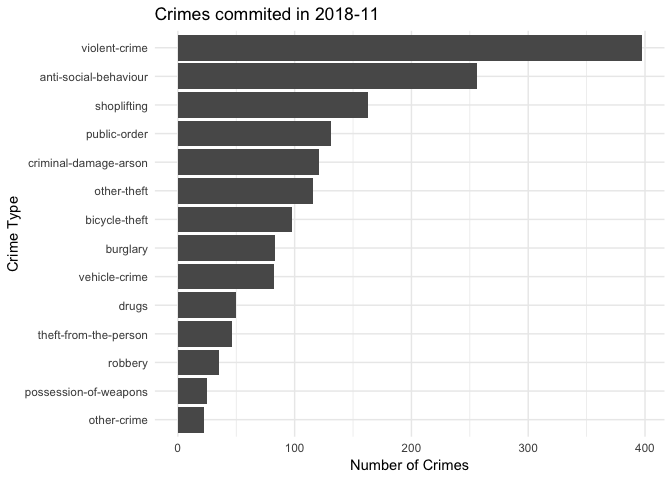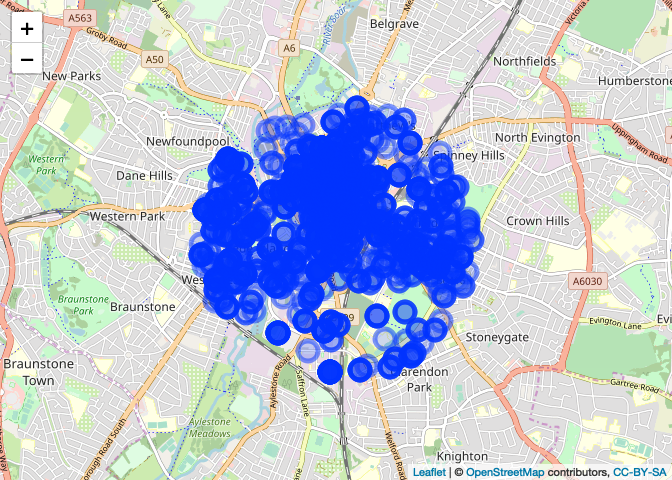ukpolice is an R package that facilitates retrieving data from the UK police database.. The data provided by the API contains public sector information licensed under the Open Government Licence v3.0.
Install from GitHub
#install.packages("remotes")
remotes::install_github("njtierney/ukpolice")ukp_crime() draws crimes from within a one mile radius of the
location. When no date is specified, it uses the latest month available,
which can be found using ukp_last_update().
library(ukpolice)
crime_data <- ukp_crime(lat = 52.629729, lng = -1.131592)
#> No encoding supplied: defaulting to UTF-8.
head(crime_data)
#> # A tibble: 6 x 12
#> category persistent_id date lat long street_id street_name context
#> <chr> <chr> <chr> <dbl> <dbl> <chr> <chr> <chr>
#> 1 anti-so… "" 2018… 52.6 -1.13 883389 On or near… ""
#> 2 anti-so… "" 2018… 52.6 -1.13 883356 On or near… ""
#> 3 anti-so… "" 2018… 52.6 -1.14 883430 On or near… ""
#> 4 anti-so… "" 2018… 52.6 -1.13 883378 On or near… ""
#> 5 anti-so… "" 2018… 52.6 -1.12 883201 On or near… ""
#> 6 anti-so… "" 2018… 52.6 -1.14 883426 On or near… ""
#> # … with 4 more variables: id <chr>, location_type <chr>,
#> # location_subtype <chr>, outcome_status <chr>
ukp_last_update()
#> No encoding supplied: defaulting to UTF-8.
#> [1] "2018-11"When date is specified, it must be in the format “YYYY-MM”. Currently
ukp_crime() only allows for searching of that current month.
crime_data_date <- ukp_crime(lat = 52.629729,
lng = -1.131592,
date = "2016-03")
#> No encoding supplied: defaulting to UTF-8.
head(crime_data_date)
#> # A tibble: 6 x 12
#> category persistent_id date lat long street_id street_name context
#> <chr> <chr> <chr> <dbl> <dbl> <chr> <chr> <chr>
#> 1 anti-so… "" 2016… 52.6 -1.13 883288 On or near… ""
#> 2 anti-so… "" 2016… 52.6 -1.13 883321 On or near… ""
#> 3 anti-so… "" 2016… 52.6 -1.13 883362 On or near… ""
#> 4 anti-so… "" 2016… 52.6 -1.13 883388 On or near… ""
#> 5 anti-so… "" 2016… 52.6 -1.13 883359 On or near… ""
#> 6 anti-so… "" 2016… 52.6 -1.11 883060 On or near… ""
#> # … with 4 more variables: id <chr>, location_type <chr>,
#> # location_subtype <chr>, outcome_status <chr>This is still a little buggy at the moment as it returns blank columns
for variables like persistent_id and context, location_subtype,
and outcome_status. This issue is currently logged at issue
#11.
library(dplyr)
#>
#> Attaching package: 'dplyr'
#> The following objects are masked from 'package:stats':
#>
#> filter, lag
#> The following objects are masked from 'package:base':
#>
#> intersect, setdiff, setequal, union
library(ggplot2)
crime_data <- ukp_crime(lat = 52.629729, lng = -1.131592)
#> No encoding supplied: defaulting to UTF-8.
crime_data %>%
count(category) %>%
ggplot(aes(x = reorder(category, n),
y = n)) +
geom_col() +
labs(x = "Crime Type",
y = "Number of Crimes",
title = paste0("Crimes commited in ",crime_data$date[1])) +
coord_flip() +
theme_minimal()You can add a popup that displays the crime type using the popup
argument in leaflet.
library(leaflet)
crime_data <- ukp_crime(lat = 52.629729, lng = -1.131592)
#> No encoding supplied: defaulting to UTF-8.
crime_data %>%
leaflet() %>%
addTiles() %>%
addCircleMarkers(popup = ~category)
#> Assuming "long" and "lat" are longitude and latitude, respectivelyukpolice does other things! At the moment other features include:
- Get crime within a polygon with
ukp_crime_poly() - Retrieve a list of neighbourhoods for a police force with
ukp_neighbourhood()
To see these examples, read the vignette “Getting Started with ukpolice”.
Please note that this project is released with a Contributor Code of Conduct. By participating in this project you agree to abide by its terms.
hex sticker police logo “Police” created by Yu luck from the Noun Project, hex sticker made with hexSticker package




